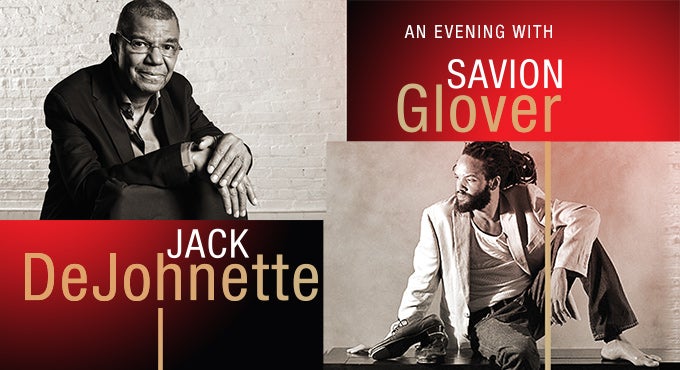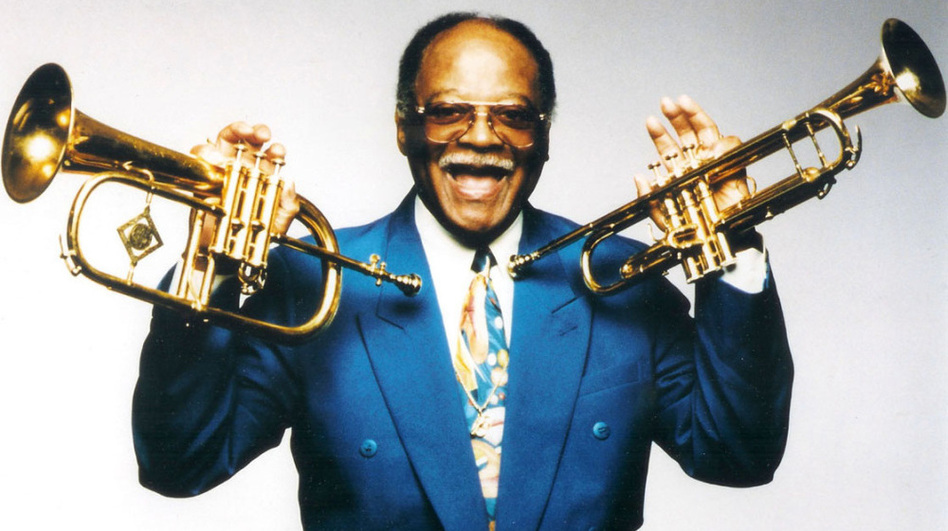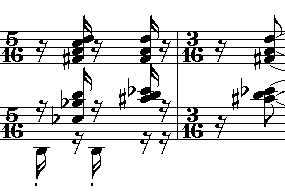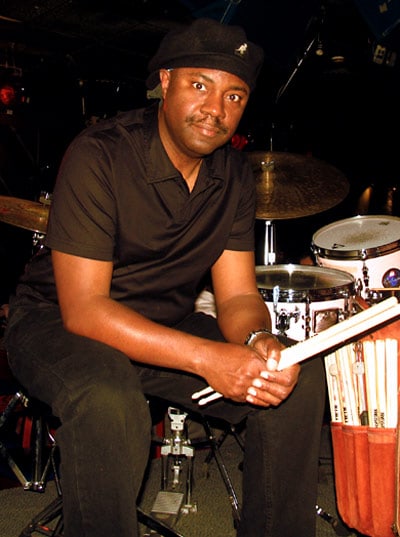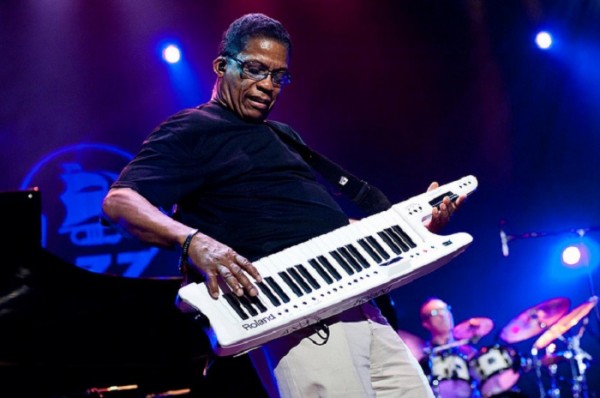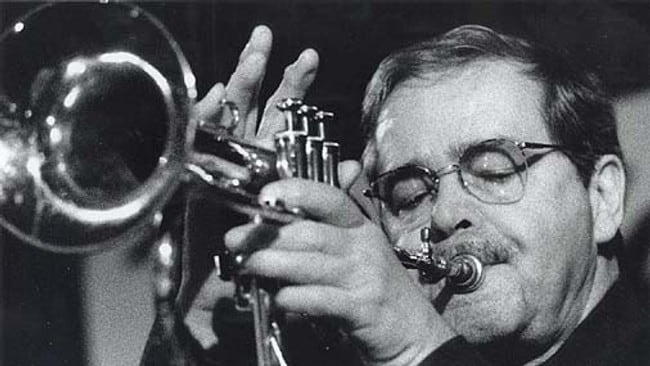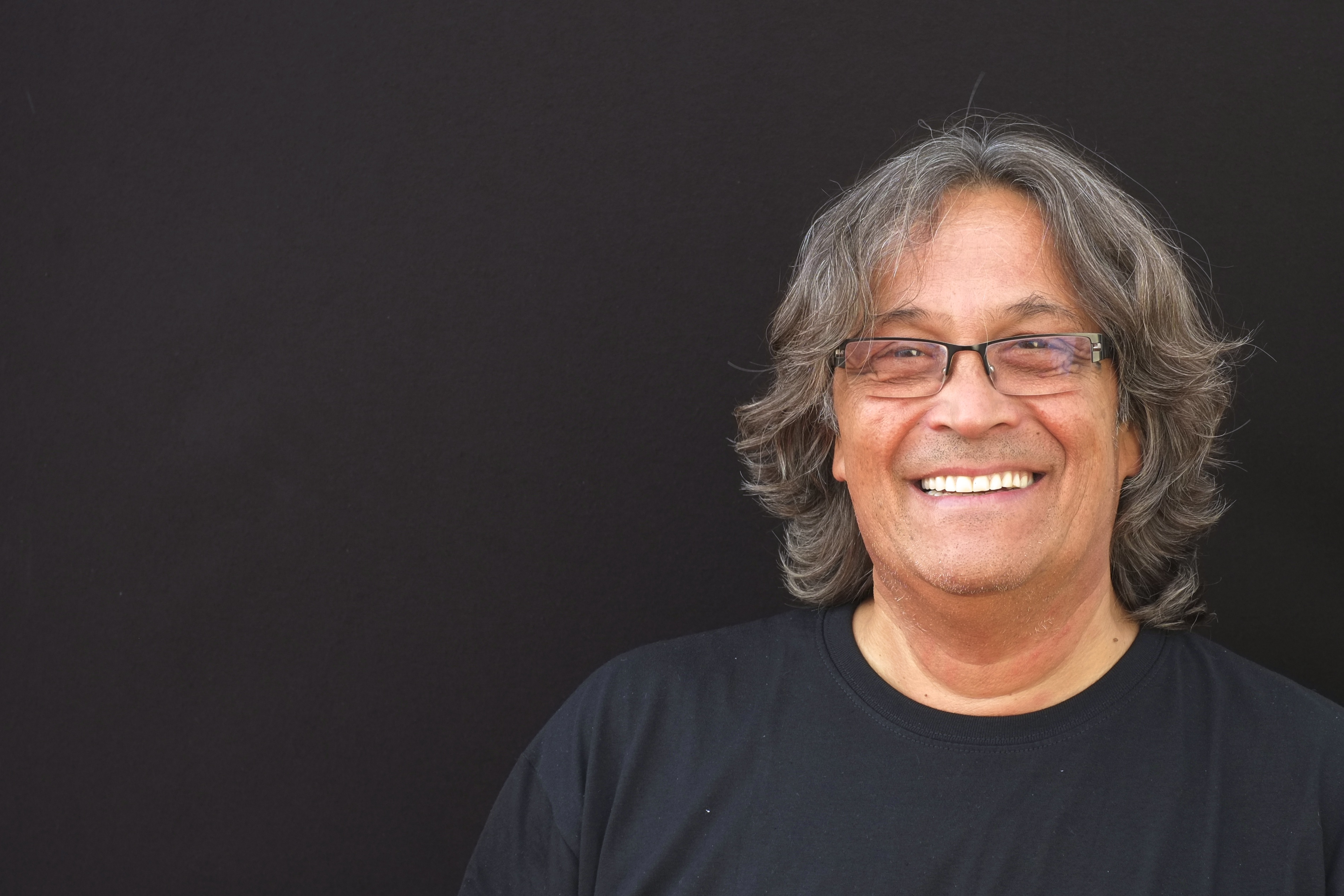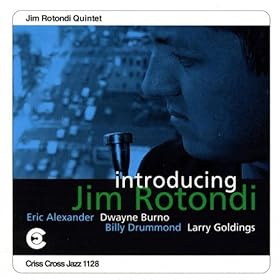-->
I recently had the good fortune to do a mini-tour with Jim Rotondi, one of the great jazz trumpeters. I have admired his playing since first hearing him in the 90's at Augie's and with the group One For All. Rotondi is trained in the old school; he knows a lot of tunes, is serious about playing changes and swinging. We played some standards that I have not played in a while; we also played some of his originals which were fun as well. After hanging with Rotondi for the week, I decided that it would be great to interview him for jazztruth.
GC: We're here with Jim Rotondi, one of the great trumpet
players in jazz. He's spent many years in NY and is now in Europe, living part
time in Graz, Austria, and where in France?
JR: The city is
called Clermont-Ferrand, it's in the dead center of France, about 3hrs south
of Paris.
GC: Can you tell me, because I know you're from Butte, MT.,
how did you get into music and when did you decide that you wanted to be a jazz
musician?
JR: I grew up as the youngest of five kids and we always
grew up with music in the house. My
mom was a piano teacher and she wanted all
of us to have music lessons, but insisted on not teaching us because she wanted
to separate family and music endeavor. The way it went down in our family was
that my mother was the musical inspiration and my father enforced all the
rules. All of us were strongly encouraged to take piano lessons, and if we
didn't want to take piano lessons, it was kind of a problem. My siblings and I
took piano lessons until about high school. Along the way, we had the option to
take up another instrument if we wanted to. I wanted to be in some kind of
musical group where I was with other people, rather than practicing solo piano.
And that's how I got into the trumpet. I started playing piano at the age of 8
and started the trumpet at12.
Now sort of briefly speaking about the musical community in
Butte, Montana, there really wasn't one. My initial exposure was from public
radio and a buddy of mine in junior high had the Clifford Brown and Max Roach
vinyl set. He was also a trumpet player and he let me take it home for a few
weeks and it completely blew my mind. Any trumpet player that hears Clifford
Brown for the first time, more or less, has to be overwhelmed.
GC: I had the same feeling.
JR: I finished high school and always had the vision to get
the hell out of Montana as soon as possible. You also asked, how did I arrive
at the decision that I wanted to be a jazz musician and make that my life
calling? That didn't happen actually until a few years after graduating high
school. Ironically, my father enforced the rules that we had to take piano
lessons, but when I decided to become a musician, it backfired on him. He
didn't want me to be a professional musician and was upset when I told him I
was going to the University of North Texas to study music. Like most fathers,
he wanted to know that I'll have security.

Anyway, I was hesitant the first two years after high school
when I was in college at U of O in Eugene, OR. I didn't know what I was going
to do, but I was enrolled in a bunch of courses that I was not going to in
favor of practicing the trumpet. I was practicing more than some of the music
majors there and always listening to music with my older brother in our
apartment. I'll never forget, I was listening to an Inner City record of Dexter
Gordon called “Bouncin' with Dex, ” with Billy Higgins and Tete Montoliu. They
were swinging like a mofo and I just looked at my brother and said, “You know
what man, I'm outta here. Next fall I'll be going to a music school.” It
happened like that.
GC: Wow, Interesting. So you went to UNT?
JR: Yep and I graduated with a Bachelor's degree in 1985.
GC: Did you go to NY right after that?
JR: No I didn't. I didn't have any bread. Since my dad was
ambivalent towards me becoming a musician, I made it a point of pride to not
ask him for money. I figured I'm gonna have to do a gig or some kind of job.
North Texas is the kind of institution that is contacted by a lot of
professionals for young student recruits. I got a call from a cruise ship and I
did that for a year to save bread. After that I moved to NY in 1987.
GC: When you got to NY, how did you get started?
JR: I met some contacts on that ship that were really
valuable. One of those contacts was Richie Vitale, a great bebop trumpet player and another guy was a keyboard
player named George Whitty. When I got to NY, I called them as well as a bunch
of other people saying that I'm in town and went to a ton of jam sessions. I
forget who recommended me to go on a tour of an off Broadway show, but it was
an R&B review show happening at the Village Gate. I went and auditioned, got the gig, and within months of
moving to New York, I was on the road. It lasted about 5 months off and on
though. But that was the start of road gigs that got me out of the city til
about 1992. I went on the road with the Artie Shaw Big Band and was called to
do the Ray Charles thing in 1991. Basically, my musical subsistence at that
point was either going on the road or doing wedding/ bar mitzvah type gigs.
GC: So cut to 1991-92, Augie's was happening. Were you on that scene?
JR: Augie's was happening before that, Joe Farnsworth was
giving weekends in 1989. In and around all the things I've been talking about,
I was doing that too. It's an outstanding experience as you know from doing
similar gigs. Joe was visionary with that gig because he could have had just
one steady group every weekend, but he used this opportunity to play with cats
he didn't normally get the chance to play with. It was through this that I met
Junior Cook and Cecil Payne, Charles Davis, and a host of other saxophone players. John Patton and Eddie
Gladden used to come play when Joe couldn't do it.
GC: So, you were going on the road and you would do this?
JR: Yeah, a big point of contention was that Joe wanted me
to reserve my weekends for his gig, but I had wedding gigs and I had to pay my
rent.
GC: Did you feel a difference between playing with Ray
Charles versus a jazz gig at Augie's?
JR: Playing with Ray Charles, for me, was a jazz gig. I was
a featured soloist, and he wanted all of us to play. he had arrangements in his
book that had Trane changes. He actually tested us to see if we had it
together. It was a blowing gig whether you liked it or not. He had a great
book; Quincy Jones, Ernie Wilkins, and all these great cats wrote for him.
GC: How long were you with Ray Charles?
JR: About a year and a half. I did one tour which was 7
months and at the end of it, I did a bunch of stuff with him but was not
officially in the group.
GC: How did One for All get started?
JR: One for All got started through Joe Farnsworth Augie's
thing. It came together piece by piece. Joe and Eric Alexander went to school
at William Patterson. Joe got the gig at Augie's and when he wasn't hiring
other cats, we were doing it as a quintet. John Webber was always on that scene
too and was playing most of those gigs. One for All officially came together
because I got a weekend at Smalls. I had been talking to David Hazeltine. At
the time he was living with Brian Lynch in Chinatown. We all thought that David
and Brian were a package deal because they played a lot with each other, but
Dave started asking us to come over for sessions when Brian was out of town. We
found out Dave had arrangements ready to go for a sextet. Joe knows Steve Davis
because Joe's from Massachusetts and Steve is from Hartford. The whole band
played together for the first time at Small's in 1992 or 93 I think. Then we
tried to doing that sextet all the time. The first time that personnel recorded
was on Steve's album Dig Deep. Six months later we did our first for Sharp
Nine.
GC: What's the status of One for All?
JR: It's harder since I don't live in the US anymore and
it's never been an easy band to book. Eric Alexander skyrocketed in popularity
in 10 yrs. There was some contention that people would perceive it as Eric
Alexander and One for All. We as the group wanted to keep it as a
co-operative, but Eric's other band was working more than we were. I think it's
unfortunate because we could've done a lot more.
GC: At some point you started pursuing teaching gigs and you
won the position at the Graz Conservatory?
JR: I'm going into my fourth year.
GC: Did you think of yourself as an educator?
JR: No, definitely not. The first two jobs I had, I didn't
seek out, they came to me. John Thaddeus and Todd Coolman both sounded me for
an adjunct gig at SUNY Purchase and I was there for 10 years. The year before I
left town, I was on the faculty for Rutgers University. I didn't think of
myself as a teacher but when they asked me to do it, I thought I would try it.
Being a teacher crystallizes what you do because if you can't clearly explain
what to do, then you really don't understand it. I felt like I had to get it
together so I could show students what I was doing and to help them with what
they wanted to do. It took me a minute, but after a while I fell into a groove
for teaching.
GC: how would you describe your way to teaching jazz?
JR: My philosophy about improvising on the trumpet is that it's
a unique study because improvising eliminates the concept of pacing. You don't
know exactly how long you're going to play. When I deal on the technical side
with students, I always talk to them about that. I also tell them think about
things that are substitutes to pacing so they don't blow out their chops right
away. I have exercises that I do that are technical but also can be musical
phrases that deal with harmonic sequence. We work a lot at the keyboard, a lot
of ear training, study language a number of ways such as transcription and
listening.
GC: What strikes me about your playing is that the music
comes through. I think the best jazz musicians transcend the instrument. Have
you always had that?
JR:I wasn't one of those natural guys. There was a period in
my development early on when I was in NY where I sought out specific technical
advice for the problems I was having. For me, it has taken me a while and I was
really fortunate to have some technique oriented teachers that have helped me a
lot. Going back to how I teach, I talk a lot about transcending the physical
difficulty of the instrument and being musical.
GC: I personally am into a lot of different types of music
and now that I teach history, I'm more fascinated with the old and with what
things people consider new but are now technically old. How do address the
notion of musicians or students rejecting the past completely as if it never
happened? What's your opinion?
JR: I think jazz music has always favored innovation but key
principles from the previous generation's music were retained. What you mention, sometimes appears to
be change at the expense of all else. Young people are always going to be
young, they're going to want to
change the world, conquer it, and do their own thing. I dig that and I think
that's very important in young people and that keeps us young. As a teacher, I
don't want to fight that, but rather balance that. My responsibility as an
older musician who knows a bit of that stuff is to get them into what has already
happened.
GC: Do you think Europe will be the center of jazz? Do you
think that NY will lose its claim to being the place that everyone feels like
they need to go?
JR: I do not, and I say that as a European musician now. I
think Europeans have their take on the music which is unique. I'm not sure
there's anything strong enough to lay claim as the capital of music.
GC: I think so too. Some people might say you have to go to
NY or Berlin but another person might not have the same experience.
JR: I still feel like there's an energy in NY that doesn't
exist in any other city.
GC: I totally agree. Especially with the music. Whether
anybody's working or not, when you play with cats from NY, you just feel it
immediately, it's different. It's hard to get that from other places.
JR: When you go back, there's a little bit of a letdown. I
don't want to be hypercritical because I'm in that community. I have a group I
work with now that contains a lot of former students. One of the things I work
with them, especially rhythm section members is maintaining energy. They always
want to have some energy and drop it down, and I don't think that's necessary.
It's more important to maintain an energy level.
GC: What was it like working with Harold Mabern?
JR: Great, [laughs] speaking of energy. He's in his late 70s
now, I guess. I worked with him about a month ago. He has more energy than any
one musician I've ever played with. The qualities I love in him aside from his
energy is his knowledge of material. He taught me a lot of things that I teach
now about harmony and substitutions. He's a selfless mentor.
GC: Do you think knowing tunes is a lost art?
JR: Yes, absolutely.
GC: How do you feel about that?
JR: I don't like it. I think studying tunes like that
informs your ideas on composing. Students want to write tunes without having
studied those song forms and harmonic sequences, and it doesn't work. They
don't know it and they're not qualified yet to write. I can think of a million
reasons to study all that music and not one reason to not study it.
GC: Do you have anything new coming up?
JR: My most recent recording (Hard Hittin' at the Bird's
Eye) came out a few months ago on the Sharp Nine label. I'm hoping to
record my electric group from Austria next fall or spring. I'm excited about
these guys because it's an opportunity for me to write in a new way. It's
different than anything I've done before.
GC: I've already heard this story, and I couldn't stop
laughing. If you can tell the story....
JR: What happened was when I recorded my first album as a
bandleader on the Criss Cross label and it's called Introducing Jim Rotondi.
I guess for some people, my name is not the easiest to pronounce.
GC: Where does your name come from?
JR: It's Italian, my grandfather was from Naples. So, there
was a certain radio DJ in the NY area back in the 90s that had an evening
program. The DJ featured some clips of my album, but he had difficulty
pronouncing my name and would always say, “That's music from brand new artist
Jeb Rodonti.” I hadn't heard it myself, but people kept on telling me that the
DJ was calling me Jeb Rodonti. I listened it one night and called the studio at
a time when the music was playing so I could talk to the DJ. I told him thanks
for playing my new record and how important that is for me. I tried telling him
my name isn't Jeb Rodonti, it's Jim Rotondi. The DJ responded, “Man, I don't
know who you really are, but I'm looking at the CD right now and it says Jeb
Rodonti.”
GC: [laughs] Ok Jim, or should I say Jeb Rodonti, Ill be sure
to spell your name right….

:format(jpeg):mode_rgb()/discogs-images/A-238626-1328259868.jpeg.jpg)

